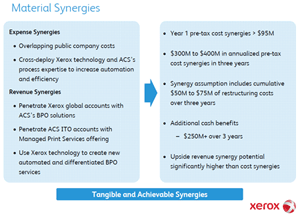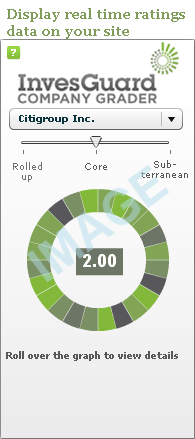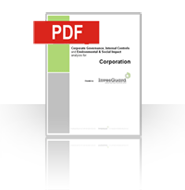-
Advantages of SubscriptionSubscription provides you the right to use all 3 levels of data.
The third and most detailed level of data which is available only to subscribers provides the most comprehensive explanation of the rating profile of companies in our database. It will provide you with information on why we think the Board Effectiveness of a company is weak or why the Audit Committee of a company can probably do better. This information may be that key element that you need over and above critical financial data to give you a complete corporate picture.
For additional information on why you should use InvesGuard please click here.
blog:
Guarding Investments one post at a time
Xerox’s Ursula Burns goes shopping! Spends almost $4 billion on ACS.
On September 28th, Xerox announced its impending purchase of ACS. Xerox CEO Ursula Burns hopes to get into the big leagues as far as Business Process Outsourcing (BPO) is concerned.
The big focus of course here is the synergies that Xerox keeps talking about:
 Click to enlarge
Click to enlarge
 Click to enlarge
Click to enlarge
Expected to catapult Xerox’s revenues to $16 billion, the deal could potentially mean the end of the road for more than a few ACS employees. Reviewing the analyst call transcript(pg 9) it appears that for ACS CEO, Lynn Blodget, the biggest synergy could be in terms of cost efficiency that arises out of using Xerox’s automation processes and image based solutions. These solutions can eliminate the need for “human beings” (Lynn’s words) which can translate into huge labor cost savings for ACS . ACS being a BPO, labor costs constitute the biggest chunk of their costs.
Speaking of labor costs, according to ACS CEO Lynn Blodgett’s employment agreement, in case of his removal from the positon of Chief Executive Officer, he gets a severance lumpsum amount equal to three times the sum of (i) his annual base salary, plus (ii) an amount equal to his discretionary bonus for the immediately preceding fiscal year. Further, any unvested stock options or other equity-based awards granted to Mr. Lynn Blodgett under the 1997 Stock Plan, the 2007 Equity Plan or any omnibus stock incentive or award plans adopted by the Company that are outstanding as of the date of such termination will become fully vested and non-forfeitable. Mr. Blodgett is also entitled to receive the excise tax gross-up benefit.
According to the ACS proxy, the change of control payments to Mr Lynn Blodget assuming a change of control on June 2008 would be $9.03 million.
Alongwith all the other labor related cleanups that the combined entity will have to do, hopefully Xerox can also be persuaded to address it’s Board deficiencies as well.
Wednesday
September 30
House Oversight Committee questions Credit Rating Agencies on their role in the financial crisis.
This morning the House Oversight Committee held a hearing on the role credit rating agencies played in the financial crisis. Besides this short summary of the hearing, InvesGuard also live blogged here.
The witnesses included:
Mr. Ilya Eric Kolchinsky- Former Managing Director Moody's Mr. Scott McCleskey- Former Senior Vice President for Compliance Moody's Mr. Richard Cantor- CRO Moody's
Mr. Kolchinsky’s allegations included among other things that:
1. Moody's values revenue generation over quality ratings, 2. The credit policy group is short staffed and bullied, 3. There are inadequate methodologies, 4. Rating models were put together in a haphazard manner, 5. The Compliance group lacks independence. 6. Same CDO's that caused huge financial crisis still being rated. 7. Moody violated Securities law by issuing ratings that they knew was wrong. 8. No standard process of review rating models during the credit crisis
Mr.Kolchinksy’s solution: The rating industry should be regulated like the accounting industry. They should have a single set of standards like the accounting industry has in terms of the Generally Accepted Accounting Principles.
Mr. McClesky’s allegations : 1. Compliance function lat Moody’s lacks independence completely. 2. Experienced compliance officers were pushed out and structured finance analysts were brought in with zero compliance experience. Such analysts were ended up passing judgment on their own previously analyzed products. 3. Mr.McClesky was sidelined and excluded from any compliance investigations. He was replaced with a structured finance expert who had rated mortgage backed securities. Mr.McClesky recommends that the compliance function should report directly to CEO and also be given access to the Board. 4. He also has concerns that Municipal Securities may not have updated ratings.
Mr.Richard Cantor, in Moody’s defense, stated that 1. Different rating analysts have different views of the same credit product.
2. Moody's supports a number of reform measures.(although not specific what these should be)
3. Addressing Mr.Kolchinsky's claims, he said that these were unsupported. A while later, during the hearing it came out that he had never seen any written report substantiating that Mr.Kolchinsky’s claims were unsupported. The outside counsel appointed by Moody’s to investigate Mr.Kolchinsky’s claims never issued a written report.
4. According to Mr. Cantor, low rated collateral securities are scrutinized closely by Moody’s. (Difficult to believe that)
On being asked what kind of a “rating” he would give Moody’s, Mr. Cantor replied “ Not very high”. Mr. Cantor, in his testimony had a kind of “I don’t know what you are talking about” blank, smiling kind of demeanor which was vaguely annoying. Obviously, he was sitting there because he was supposed to know things, right?
Oddly enough, according to Rep Kanjorski, the whistleblowers have not reported any major issue such as gross negligence on Moody’s part. Seems to be a situation where a colleague was not invited to a meeting and is now disgruntled. Hmmm, then why invite these whistleblowers at all in the first place and ask questions?
Another shocker….SEC got in touch with Mr.Kolchinsky only last week, after the hearing was announced.
Various suggestions were floated on how best to conquer the rating beast…
1. Oversight Board similar to the Public Company Accounting Oversight Board. 2. Compliance function to report to the CEO.(Mr. McClesky suggested this) 3. Incentive program for all the participants in the securitization process should be revamped. (Mr.Kolchinsky’s suggestion) 4. Increase number of competitors in the rating arena. 5. Set minimum standards that an issuer must provide the rating agency in order to get their financial product rated.
The committee has asked for all the papers, memos and internal documents related to the investigation that Moody’s conducted into Mr. Kolchinsky’s allegations. There was a great deal of back and forth on whether this will be made available or not.
Wednesday
September 30





